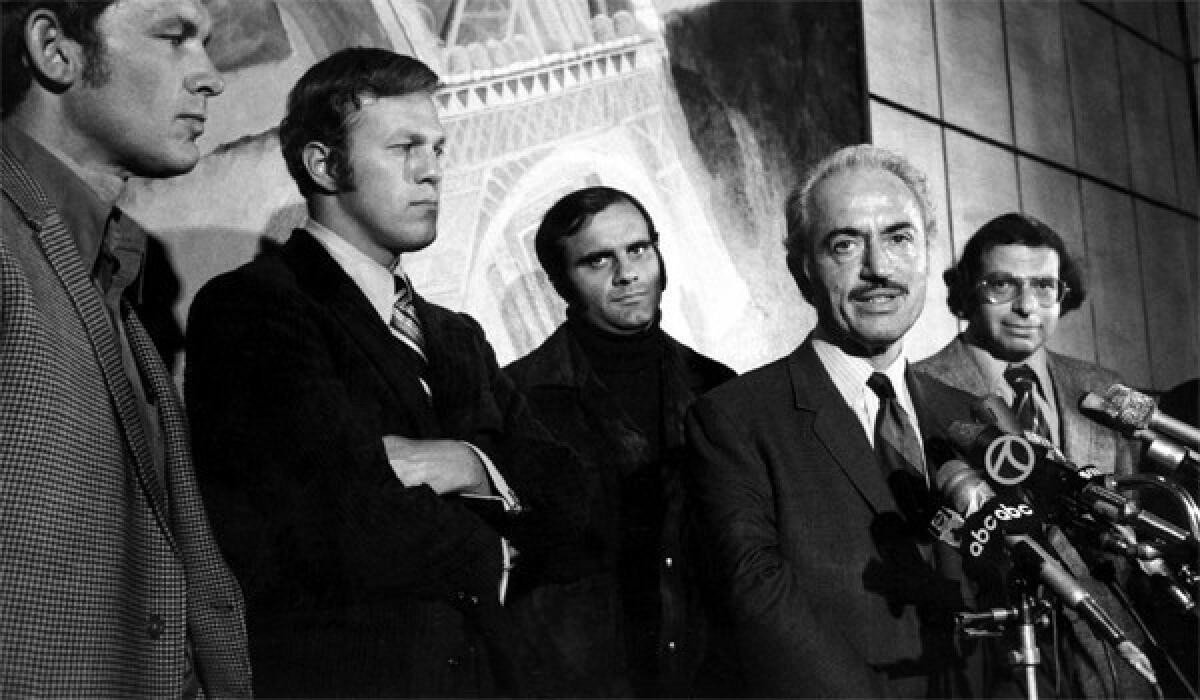Remembrance: Marvin Miller was a transformative figure in sports

- Share via
He didn’t look like much of a revolutionary. He looked like an economist, which he was, only with some serious attitude. Kind of bookish, but with an unnerving gleam in his eye.
The last guy you ever wanted to get into a fight with was Marvin Miller. He was a bulldog, feisty and intractable and fearless.
He was 5 feet 8 and 150 pounds. He had silver hair, a thin mustache and looked like somebody who went through three packs a day.
And just might have been the most influential man in sports history.
That’s a pretty subjective claim, of course, but it’s not hard to argue. Miller changed not only the face of baseball — for which he is often given credit — but all American professional sports.
Miller died Tuesday at 95, and you like to think that with his last breath he still uttered a final stinging shot at the baseball establishment.
Incredibly, the Hall of Fame, to its ever-lasting embarrassment, never welcomed Miller. He wasn’t elected when the Veterans Committee consisted largely of former players who benefited from free agency and salary arbitration, the one-two spark that ignited baseball’s skyrocketing salaries.
Miller missed by one vote in 2010, when he was last considered by the current version of the Veterans Committee, which is heavy on members from ownership. He will be considered again a year from now, by the Expansion Era Committee, for possible induction in 2014.
Even Commissioner Bud Selig came to recognize Miller’s merit, saying, “If the criteria is what impact you had on the sport, whatever way one wants to value that impact … Marvin Miller should be in the Hall.”
Professional sports are at their apex right now, and in no small part because of Miller. Before he arrived on the scene, there was no free agency, no arbitration, no real pension plan, no real grievance opportunities for players, no collective bargaining agreement.
Miller did not start the Major League Baseball Players Assn., but he invented it. Organized it from a shell. As the union’s executive director, he took the players out of the dark ages and carried them into the modern world.
“The word ‘pioneer’ is sometimes used loosely,” longtime agent Tom Reich told ESPN’s Jayson Stark. “But he was all that. He was a true pioneer. In the world of baseball, he was as close to a biblical figure as you’ll find.”
Of course, without Miller professional sports would also not know of strikes and lockouts and collusion. Those terms were the tools of his trade when he led the United Steelworkers and he brought them to baseball. Owners had no idea what awaited.
Until Miller, players were bound for life to their team. The only player movement came via a trade. Miller likened them to indentured servants, one of his many comments that got under owners’ skin, like its own baseball basal cell carcinoma.
Players were paid so little, it was common for them to have off-season jobs. When Miller took over as executive director of the players union in 1966, the average player salary was $19,000. Today it’s about $3 million.
He took baseball to its knees. Owners had been impervious, had paid what they wanted, kept the players they wanted, ran baseball completely the way they wanted. But the players were the stars, and Miller knew that. Knew he had the right of law on his side too.
Credit Miller for making owners understand that players are partners in the game. The sport generated $50 million in revenue in Miller’s first full season in baseball. That figure was about $7.5 billion this year and is expected to surpass $8 billion next season.
Miller got the players what they deserved and his movement spread to all the other major sports. The players are all indebted to Miller. Vin Scully’s mentor, Red Barber, once ranked Miller with Babe Ruth and Jackie Robinson as the three most influential people in baseball history.
He was right too. Miller wasn’t warm and fuzzy, but he justly earned the undying respect of the players — and maybe the eternal enmity of owners.
Yet, he was a true transformational figure in American sports. There have been precious few of those. And there may have been no one quite like Miller, the perfect man for his moment in time.
ALSO:
Marvin Miller dies; baseball union chief led push for free agency
Angels, closer Ryan Madson reach agreement on contract
Dodgers’ proposed TV deal has baseball world in uproar
More to Read
Go beyond the scoreboard
Get the latest on L.A.'s teams in the daily Sports Report newsletter.
You may occasionally receive promotional content from the Los Angeles Times.










